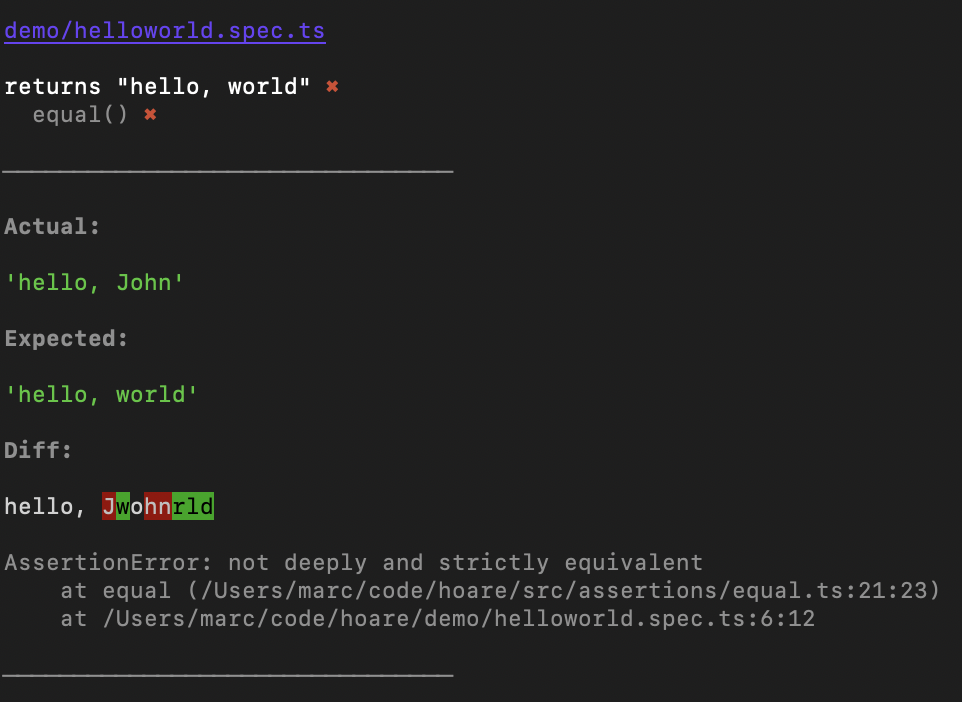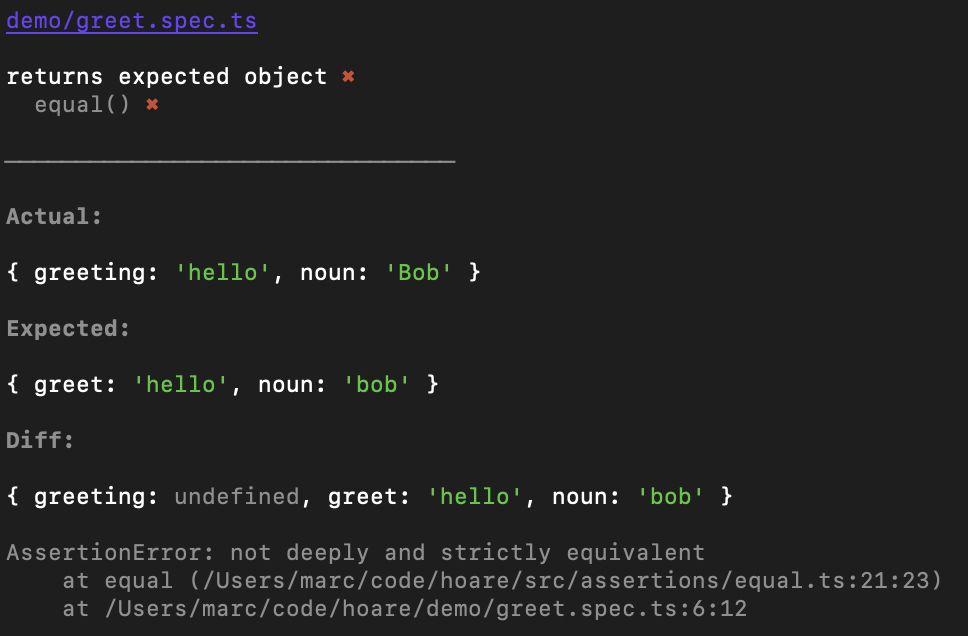An easy-to-use, fast, and defensive Typescript/Javascript test runner designed to help you to write simple, readable, and maintainable tests.
Named after Sir Tony Hoare, the inventor of the Hoare Triple which is the cornerstone of unit testing.
🔒 Out-of-the-box Typescript support
- Written in Typescript. No special configuration needed, and no plugins to install.
- Works great with c8 for code coverage.
- Handles compilation errors gracefully.
🛡 Defensive
- Uncaught errors and unhandled promise rejections will cause the test to fail.
- Any spec files without tests, or tests without assertions, result in a failed test.
- Strict and deep equality comparison by default.
🚀 Fast & Reliable
- Multi-process parallel test runner. Each spec file is run in its own process and runtime for speed and isolation benefits.
- Optimized for speed and simplicity.
- Minimal dependencies.
😀 Easy to Use
- Simple assertion API. You shouldn't need to learn a new language to read and write tests. Assertions should be simple axiomatic logic.
- Built-in powerful diff visualization tool.
- Errors or unhandled promise rejections are buffered and grouped under the test file in the output. This helps you know where they came from.
✨ Modern Features
- Async/Await/Promise Support
- Simple API facilitates functional programming patterns and AI test generation.
- Examples
- Installation & Setup
- Basic Usage
- API
- Visual Diff Tool
- Inspiration, Philosophy & Attribution
- FAQ
- Support, Feedback, and Contributions
- License
helloworld.ts
export function helloworld() {
return 'hello, world';
}helloworld.spec.ts
import {test} from 'hoare';
import {helloworld} from './helloworld';
test('should return "hello, world"', (assert) => {
assert.equal(helloworld(), 'hello, world');
});You can use cjs-mock to mock dependencies (only works with CommonJS modules). This is especially useful for mocking file system operations, network requests, or other side effects.
isValidWord.ts
import {readFile} from 'fs/promises';
export async function isValidWord(word: string) {
const validWords = await getValidWords();
return validWords.indexOf(word) !== -1;
}
async function getValidWords() {
const contents = await readFile('./dict.txt', 'utf-8');
return contents.split('\n');
}isValidWord.spec.ts
import {test} from 'hoare';
import {mock} from 'cjs-mock';
import * as mod from './isValidWord'; // just used for typing
const dict = ['dog', 'cat', 'fish'].join('\n');
const mockMod: typeof mod = mock('./isValidWord', {
'fs/promises': {readFile: () => Promise.resolve(dict)},
});
test('valid word returns true', async (assert) => {
const result = await mockMod.isValidWord('dog');
assert.equal(result, true);
});
test('invalid word returns false', async (assert) => {
const result = await mockMod.isValidWord('nope');
assert.equal(result, false);
});-
Install from npm along with peer dependencies:
npm i typescript ts-node c8 hoare -D -
Make sure your tsconfig.json file has the following compiler options set:
{ "module": "CommonJS", "sourceMap": true }Note: If you are using a different module systems such as ESM, you can create a separate
tsconfig.test.jsonfile and use the--projectflag withtscorts-node, or use command line flags. -
Create an
.c8rc.jsonfile in the root of your project (or use another config option), following the c8 documentation. For an example, see our .c8rc.json file. -
Add the following command to your
package.jsonscriptsdirective:{ "test": "c8 hoare 'src/**/*.spec.@(ts|js)' && c8 report -r text -r html" }
The above command, along with our .c8rc.json file settings, will do the following:
- Run
c8for code coverage. - Run any
.spec.jsor.spec.tsfile within thesrcfolder, recursively. - If the test is successful, generate both an HTML and text coverage report.
You can customize the above command to your situation. The string in quotes is a glob.
-
Install from npm along with
c8:npm i c8 hoare -D -
Add the following command to your
package.jsonscriptsdirective:{ "test": "c8 hoare 'src/**/*.spec.js' && c8 report -r text -r html" }
-
Install from npm:
npm i hoare -D -
Add the following command to your
package.jsonscriptsdirective:{ "test": "hoare 'src/**/*.spec.js'" }
# glob
npx hoare 'src/**/*.spec.ts'
# a specific file
npx hoare 'src/foo.spec.ts'-
Write your tests with a
.spec.tsor.spec.jsextension (although any extension will work as long as it matches the glob provided).Tip: we recommend you put your source code in a
srcfolder and keep your test files alongside the source, and not in a separate folder. -
Simply run
npm test, or directly vianpxas shown above.
Example file structure:
dist // built files
src
foo.ts
foo.spec.ts
Create a test. cb can be an async function.
equal(actual: any, expected: any, msg?: string): void
Asserts deep and strict equality on objects or primitives. This will give you a visual diff output for any discrepancies.
throws(experiment: () => any, expectedError: Error, msg?: string): void
Asserts that the function experiment throws an error that is equivalent to expectedError, ignoring stack traces.
It uses errorsEquivalent() under the hood, so it will check for both non-enumerable properties (ie, name and message) and enumerable properties (anything added by extending Error).
Example:
import {test} from 'hoare';
function mustBe42(num: number): void {
if (num !== 42) {
throw new Error('expected 42');
}
}
test('mustBe42()', (assert) => {
assert.equal(mustbe42(42), undefined, 'should not throw if 42');
assert.throws(() => mustBe42(15), new Error('expected 42'), 'should throw if not 42');
});errorsEquivalent(err1: any, err2: any, msg?: string)
Asserts that both errors are similar. Stack traces are ignored. It checks for both non-enumerable properties
(ie, name and message) and enumerable properties (anything added by extending Error).
Under the hood it uses equal() and you will get a visual diff output for any discrepancies.
Both errors must be an instance of Error, or an error will be thrown.
Tip: You may want to use
throws()instead of this method for convenience, as this will catch the error for you without need to wrap it in a try/catch block.
Any assertion using equals() under the hood that fails will output a visual diff of the differences between the actual and expected values.
- Star this repo if you like it!
- Submit an issue with your problem, feature request or bug report
- Issue a PR against
mainand request review. Make sure all tests pass and coverage is good. - Write about unit testing best practices and use hoare in your examples
Together we can make software more reliable and easier to maintain!
MIT © Marc H. Weiner




